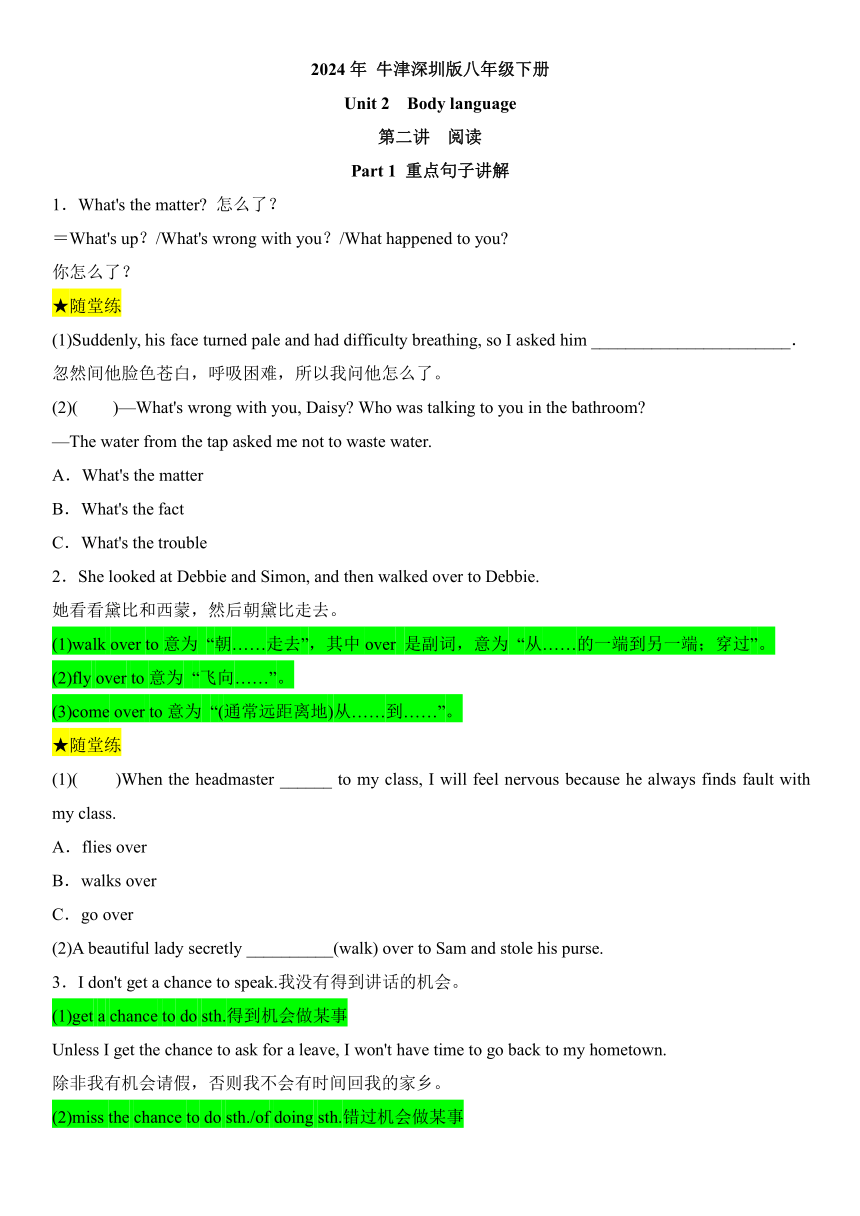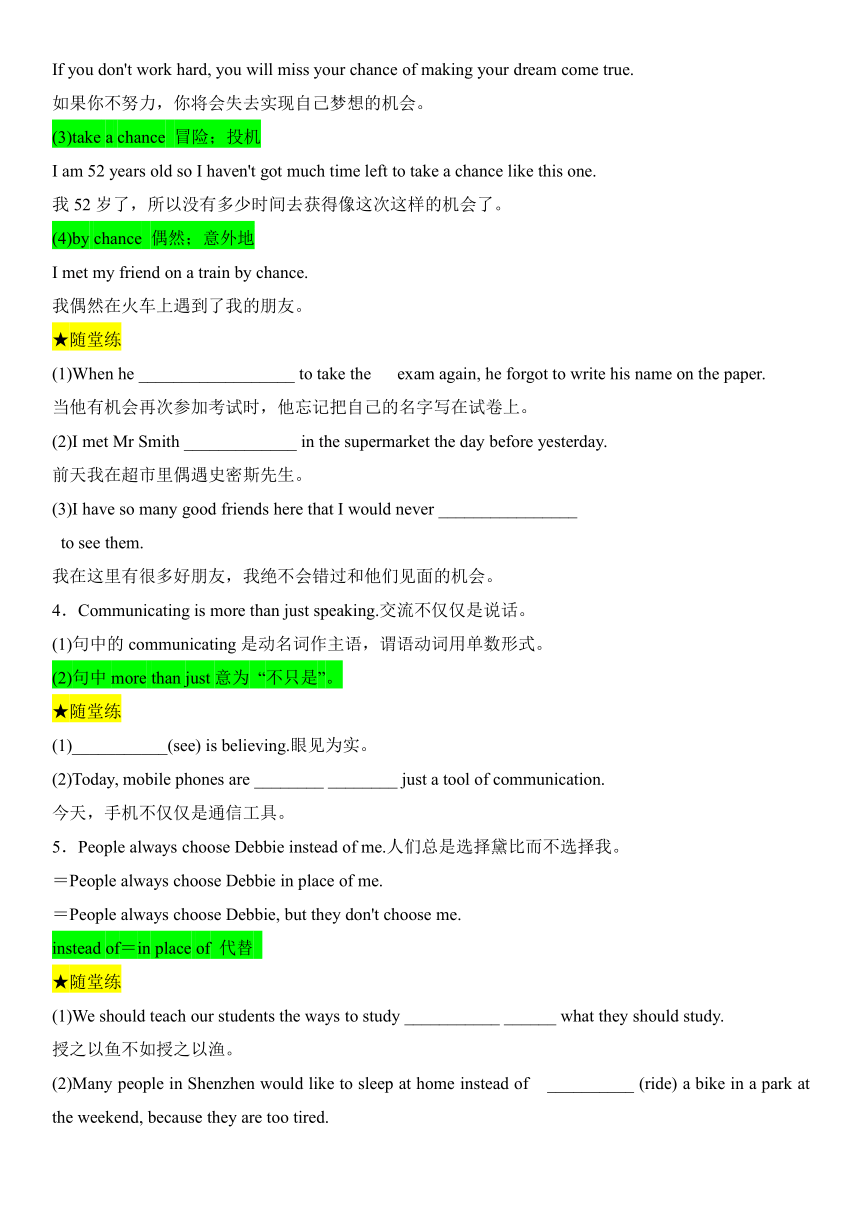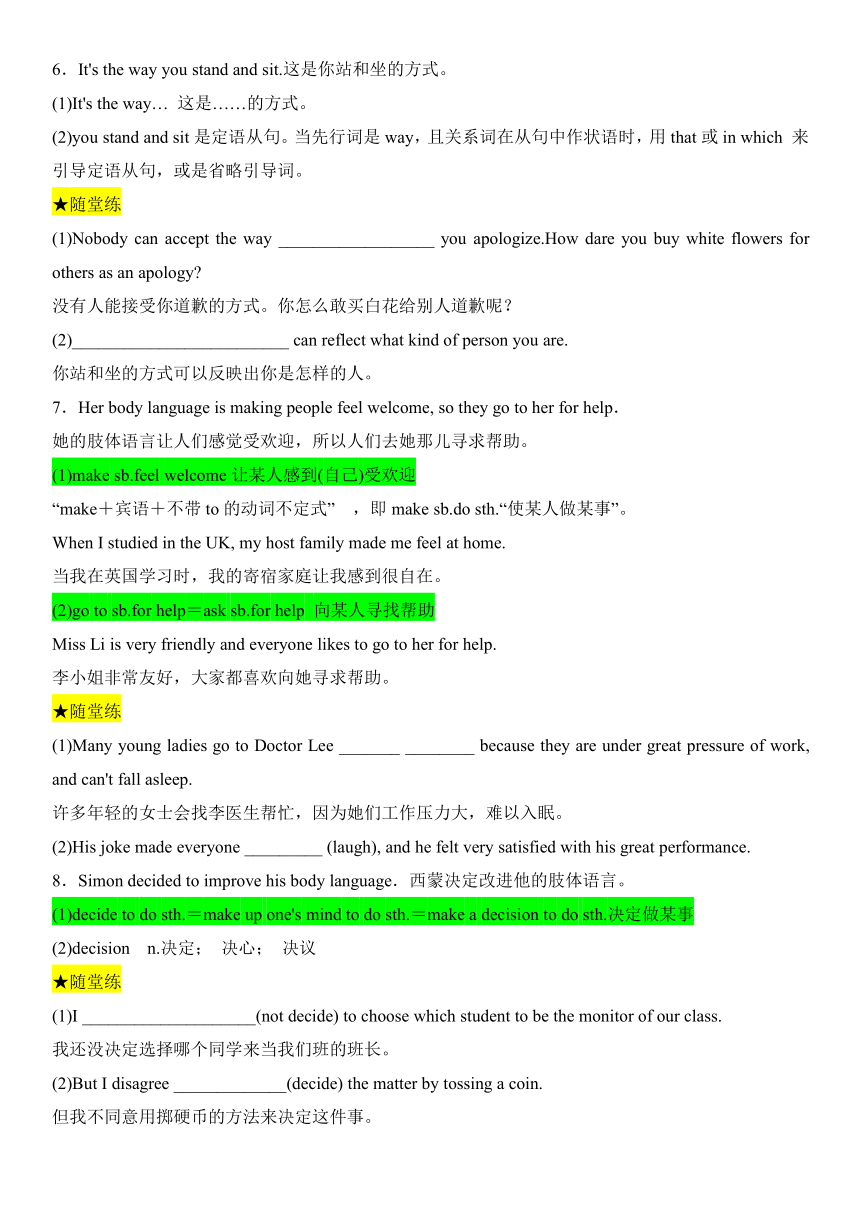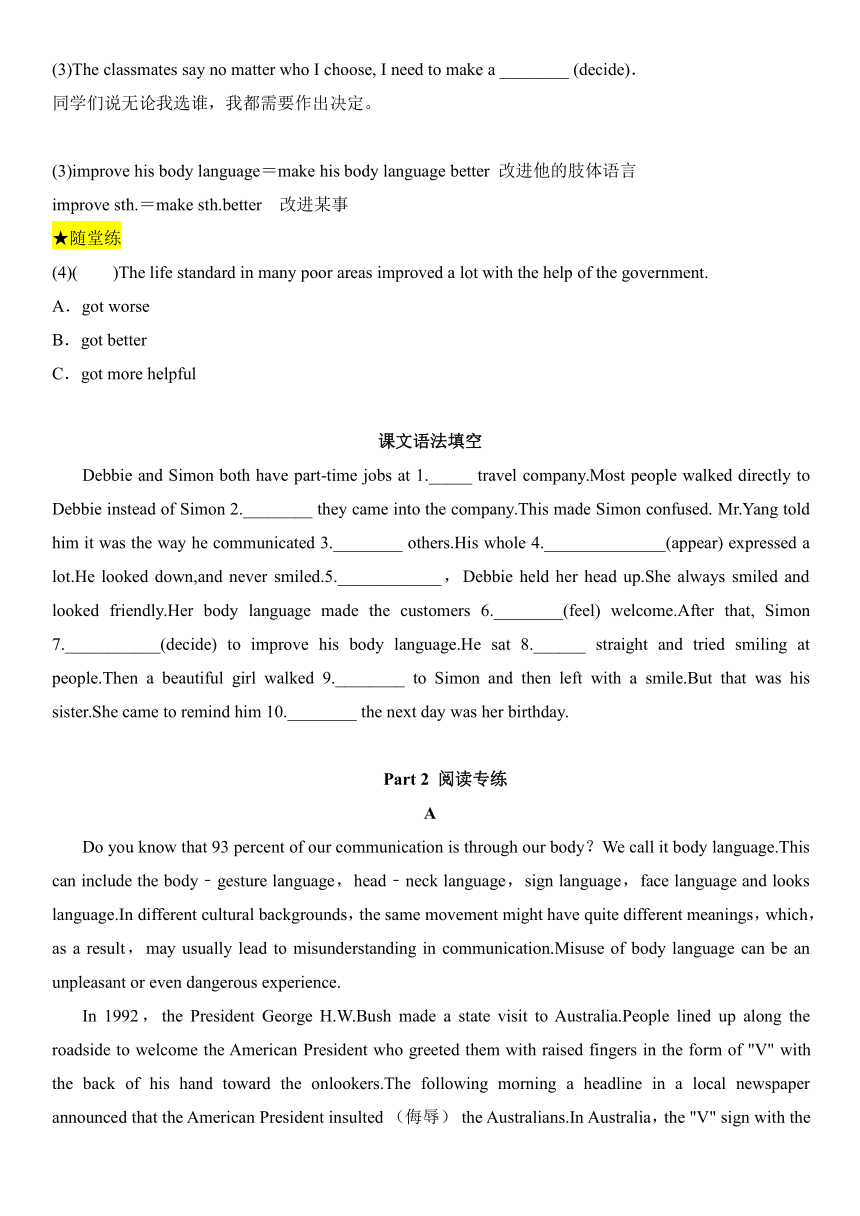Module 1 Unit 2 Numbers阅读学案(含答案)牛津深圳版(广州沈阳通用)八年级英语下册
文档属性
| 名称 | Module 1 Unit 2 Numbers阅读学案(含答案)牛津深圳版(广州沈阳通用)八年级英语下册 |

|
|
| 格式 | docx | ||
| 文件大小 | 87.3KB | ||
| 资源类型 | 教案 | ||
| 版本资源 | 牛津深圳版 | ||
| 科目 | 英语 | ||
| 更新时间 | 2024-02-01 10:43:25 | ||
图片预览





文档简介
2024年 牛津深圳版八年级下册
Unit 2 Body language
第二讲 阅读
Part 1 重点句子讲解
1.What's the matter 怎么了?
=What's up?/What's wrong with you?/What happened to you
你怎么了?
★随堂练
(1)Suddenly, his face turned pale and had difficulty breathing, so I asked him _______________________.
忽然间他脸色苍白,呼吸困难,所以我问他怎么了。
(2)( )—What's wrong with you, Daisy Who was talking to you in the bathroom
—The water from the tap asked me not to waste water.
A.What's the matter
B.What's the fact
C.What's the trouble
2.She looked at Debbie and Simon, and then walked over to Debbie.
她看看黛比和西蒙,然后朝黛比走去。
(1)walk over to意为 “朝……走去”,其中over 是副词,意为 “从……的一端到另一端;穿过”。
(2)fly over to意为 “飞向……”。
(3)come over to意为 “(通常远距离地)从……到……”。
★随堂练
(1)( )When the headmaster ______ to my class, I will feel nervous because he always finds fault with my class.
A.flies over
B.walks over
C.go over
(2)A beautiful lady secretly __________(walk) over to Sam and stole his purse.
3.I don't get a chance to speak.我没有得到讲话的机会。
(1)get a chance to do sth.得到机会做某事
Unless I get the chance to ask for a leave, I won't have time to go back to my hometown.
除非我有机会请假,否则我不会有时间回我的家乡。
(2)miss the chance to do sth./of doing sth.错过机会做某事
If you don't work hard, you will miss your chance of making your dream come true.
如果你不努力,你将会失去实现自己梦想的机会。
(3)take a chance 冒险;投机
I am 52 years old so I haven't got much time left to take a chance like this one.
我52岁了,所以没有多少时间去获得像这次这样的机会了。
(4)by chance 偶然;意外地
I met my friend on a train by chance.
我偶然在火车上遇到了我的朋友。
★随堂练
(1)When he __________________ to take the exam again, he forgot to write his name on the paper.
当他有机会再次参加考试时,他忘记把自己的名字写在试卷上。
(2)I met Mr Smith _____________ in the supermarket the day before yesterday.
前天我在超市里偶遇史密斯先生。
(3)I have so many good friends here that I would never ________________
to see them.
我在这里有很多好朋友,我绝不会错过和他们见面的机会。
4.Communicating is more than just speaking.交流不仅仅是说话。
(1)句中的communicating是动名词作主语,谓语动词用单数形式。
(2)句中more than just意为 “不只是”。
★随堂练
(1)___________(see) is believing.眼见为实。
(2)Today, mobile phones are ________ ________ just a tool of communication.
今天,手机不仅仅是通信工具。
5.People always choose Debbie instead of me.人们总是选择黛比而不选择我。
=People always choose Debbie in place of me.
=People always choose Debbie, but they don't choose me.
instead of=in place of 代替
★随堂练
(1)We should teach our students the ways to study ___________ ______ what they should study.
授之以鱼不如授之以渔。
(2)Many people in Shenzhen would like to sleep at home instead of __________ (ride) a bike in a park at the weekend, because they are too tired.
6.It's the way you stand and sit.这是你站和坐的方式。
(1)It's the way… 这是……的方式。
(2)you stand and sit是定语从句。当先行词是way,且关系词在从句中作状语时,用that或in which 来引导定语从句,或是省略引导词。
★随堂练
(1)Nobody can accept the way __________________ you apologize.How dare you buy white flowers for others as an apology
没有人能接受你道歉的方式。你怎么敢买白花给别人道歉呢?
(2)_________________________ can reflect what kind of person you are.
你站和坐的方式可以反映出你是怎样的人。
7.Her body language is making people feel welcome, so they go to her for help.
她的肢体语言让人们感觉受欢迎,所以人们去她那儿寻求帮助。
(1)make sb.feel welcome让某人感到(自己)受欢迎
“make+宾语+不带to的动词不定式” ,即make sb.do sth.“使某人做某事”。
When I studied in the UK, my host family made me feel at home.
当我在英国学习时,我的寄宿家庭让我感到很自在。
(2)go to sb.for help=ask sb.for help 向某人寻找帮助
Miss Li is very friendly and everyone likes to go to her for help.
李小姐非常友好,大家都喜欢向她寻求帮助。
★随堂练
(1)Many young ladies go to Doctor Lee _______ ________ because they are under great pressure of work, and can't fall asleep.
许多年轻的女士会找李医生帮忙,因为她们工作压力大,难以入眠。
(2)His joke made everyone _________ (laugh), and he felt very satisfied with his great performance.
8.Simon decided to improve his body language.西蒙决定改进他的肢体语言。
(1)decide to do sth.=make up one's mind to do sth.=make a decision to do sth.决定做某事
(2)decision n.决定; 决心; 决议
★随堂练
(1)I ____________________(not decide) to choose which student to be the monitor of our class.
我还没决定选择哪个同学来当我们班的班长。
(2)But I disagree _____________(decide) the matter by tossing a coin.
但我不同意用掷硬币的方法来决定这件事。
(3)The classmates say no matter who I choose, I need to make a ________ (decide).
同学们说无论我选谁,我都需要作出决定。
(3)improve his body language=make his body language better 改进他的肢体语言
improve sth.=make sth.better 改进某事
★随堂练
(4)( )The life standard in many poor areas improved a lot with the help of the government.
A.got worse
B.got better
C.got more helpful
课文语法填空
Debbie and Simon both have part-time jobs at 1._____ travel company.Most people walked directly to Debbie instead of Simon 2.________ they came into the company.This made Simon confused. Mr.Yang told him it was the way he communicated 3.________ others.His whole 4.______________(appear) expressed a lot.He looked down,and never smiled.5.____________,Debbie held her head up.She always smiled and looked friendly.Her body language made the customers 6.________(feel) welcome.After that, Simon 7.___________(decide) to improve his body language.He sat 8.______ straight and tried smiling at people.Then a beautiful girl walked 9.________ to Simon and then left with a smile.But that was his sister.She came to remind him 10.________ the next day was her birthday.
Part 2 阅读专练
A
Do you know that 93 percent of our communication is through our body?We call it body language.This can include the body﹣gesture language,head﹣neck language,sign language,face language and looks language.In different cultural backgrounds,the same movement might have quite different meanings,which,as a result,may usually lead to misunderstanding in communication.Misuse of body language can be an unpleasant or even dangerous experience.
In 1992,the President George H.W.Bush made a state visit to Australia.People lined up along the roadside to welcome the American President who greeted them with raised fingers in the form of "V" with the back of his hand toward the onlookers.The following morning a headline in a local newspaper announced that the American President insulted (侮辱) the Australians.In Australia,the "V" sign with the back of the hand equals to the middle finger.But in America it means victory.
Have you understood the importance of body language?Pay attention to the following and you will realize that they are very helpful when you are in Australia.
Men in Australia shake hands instead of kissing when they meet.In China,thumbing up means "You are good".However,it's rude in Australia.If an Australian laughs at others,he makes his thumb down.If you want to order a glass of beer in the bar,just hold up your forefinger.And in social situation,you shouldn't yawn or stretch yourself.
Keep these in mind and have a nice trip in Australia.
(1)How many body languages did the author mention in the first paragraph?
A.Three.
B.Four.
C.Five.
D.Six.
(2)What did the Australians think of American President Bush after he visited Australia in 1992?
A.He was friendly to Australia.
B.He was rude and impolite.
C.He was a lovely person.
D.He was a real man.
(3)How should you act if you want to have beer in the bar of Australia?
A.You can put your thumb up.
B.You can shake hands.
C.You can raise your fingers.
D.You can hold up your forefinger.
(4)After we read the passage,we learn that .
A.we only communicate by using words
B.Bush's visit to Australia in 1992 is successful
C.it's impolite to thumb down in Australia
D.you can stretch yourself in public in Australia
(5)Who is the passage written for?
A.Tourists.
B.Businessmen.
C.Officials.
D.Players.
B
①As humans,we communicate(交流)by using the senses(感觉)of sight,touch,and hearing.We send messages with body language,we greet friends with touch,and we speak by using words to show our feelings and ideas.Animals don't communicate in as many ways as us — for example,they don't have languages like we do — but many animals do also use the senses of sight,touch,and hearing.A good example of this is elephant communication.
②Like us,elephants understand each other by looking at each other's body language.To send a message,they use their whole body,or just their heads,eyes,mouth,ears,trunk,tail,or feet.For example,elephants spread(展开)their ears to show anger.And while people shake(摇晃)their heads to say no,elephants do this to show they are happy.
③Touch is also very important between elephants.Just like a human mother holds her baby,a mother elephant regularly(有规律地)touches her young baby with her trunk.Elephants also show they are friendly when they touch other elephants.And when they want to have fun,they hold each other by the trunk and pull.Although they can't laugh like a human,elephants have a great sense of humor.
④Elephants have very large ears,which means they can hear other elephants from as far as 2.5 miles away.Like humans,they can also copy sounds and make their own sounds that seem to communicate some human words and phrases like,"Hello" "I love you" and "Let's go".
⑤So while it's true that humans are amazing at communication,elephants also communicate in ways that we can't,and that may be true for other animals,too.The next time your pet dog or cat looks at you,touches you,or makes a noise,maybe it's trying to tell you something very important!
(1)How do elephants show they are happy?
A.By using their whole body.
B.By spreading their ears.
C.By shaking their heads.
D.By touching other elephants.
(2)According to the passage,what can elephants do?
A.They can copy sounds they hear.
B.They can speak with words.
C.They can laugh like a human.
D.They can have languages.
(3)Which is the best structure of the passage?
A.
B.
C.
D.
(4)What's the purpose(目的) of writing the passage?
A.To tell why elephants have languages.
B.To express how smart elephants are.
C.To tell what elephants can do.
D.To tell how elephants communicate.
C
六选五
Different kinds of body languages show different etiquette(礼仪)cultures in different countries.Shaking hands and bowing are examples of body language.In China,shaking hands means greeting. (1) It is important social etiquette in Japan.Receiving a bow,it is polite and necessary to return one to whoever greets you. (2) In Japan,you can bow when you say "thank you", "sorry", "hello", "goodbye", "congratulations", "excuse me", "good morning" and more. (3) It means "welcome" , "friendship", "congratulations", "thanks", "respect", "sorry", "take care", "goodbye" and so on.
Both shaking hands and bowing seem simple,but there are different ways to do so. (4) If you meet someone who is of higher social position or older than you in Japan,you are supposed to bow deeper and longer than him or her.The same is true of Chinese etiquette culture.The elder and the younger shake hands.The elder reaches out first,and the younger cannot refuse to take the grip(紧握)quickly. (5)
We use body languages every day,and using them properly is a key ability in our lives.
A.One body language can mean many things. B.They depend on the social position or age of the person you greet. C.While in Japan,bowing is widely used to greet each other. D.So we should master the etiquette of body language. E.If it is not a very serious situation,you can bow by nodding. F.Handshaking shows a richer meaning in China.
参考答案
Part 1
1.(1)what was the matter
(2)A
2.(1)B (2)walked
3.(1)got the chance (2)by chance
(3)miss the chance
4.(1)Seeing (2)more than
5.(1)instead of (2)riding
6.(1)that/ in which (2)The way you stand and sit
7.(1)for help (2)laugh
8.(1)haven’t decided (2)to decide
(3)decision (4)B
课文语法填空
1.a 2.when 3.with 4.appearance 5.However 6.feel
7.decided 8.up 9.over 10.that
Part2阅读理解专练
A
CBDCA
【分析】本文主要介绍了身体语言的重要性以及在不同文化背景下可能导致误解的情况。文章举例说明了美国总统在澳大利亚使用手势时引起的误会,强调了在不同国家需要注意不同的身体语言习惯。最后提醒读者在澳大利亚旅行时需要注意一些当地的身体语言习惯,以避免造成不必要的尴尬。
【解答】(1)细节理解题。根据第一段"This can include the body﹣gesture language,head﹣neck language,sign language,face language and looks language"(这可以包括肢体语言、头颈语言、手语、面部语言和表情语言)可知体态语包括肢体语言、头颈语言、手语、面部语言和表情语言,一共5种语言。故选C。
(2)推理判断题。根据第二段"The following morning a headline in a local newspaper announced that the American President insulted (侮辱) the Australians"(第二天早上,当地一家报纸的头条宣称美国总统侮辱了澳大利亚人)可知,澳大利亚人认为美国总统侮辱他们,可见他们认为美国总统是粗鲁和不礼貌的。故选B。
(3)细节理解题。根据倒数第二段"If you want to order a glass of beer in the bar,just hold up your forefinger."(如果你想在酒吧里点一杯啤酒,只要伸出食指就行了。)可知如果你想在酒吧点一杯啤酒,只需举起食指。故选D。
(4)细节理解题。根据倒数第二段"If an Australian laughs at others,he makes his thumb down."(如果澳大利亚人嘲笑别人,他会把拇指朝下。)可知,如果一个澳大利亚人嘲笑别人,他会拇指朝下,这是不礼貌的。故选C。
(5)推理判断题。根据最后一段"Keep these in mind and have a nice trip in Australia."(记住这些,祝你澳大利亚之行愉快。)可知,本文是写给想去澳大利亚旅行的游客的。故选A。
B
CAAD
【分析】本文是一篇说明文,告诉读者大象这种动物是怎么交流的。
【解答】(1)细节理解题。根据第二段"And while people shake(摇晃)their heads to say no,elephants do this to show they are happy."(当人摇头表示不同意时,大象这样做是为了表示他们很高兴。)可知大象通过摇头表示自己很开心。故选C。
(2)细节理解题。根据第四段"Like humans,they can also copy sounds and make their own sounds"(和人类一样,它们也可以复制声音并发出自己的声音。)可知大象会模仿声音。故选A。
(3)篇章结构题。文章第一段通过人类的交流方式引出大象也有交流方式。第二三四段讲了大象是怎样交流的。最后一段点出人和动物不同的交流方式,提醒我们多观察。文章结构为总分总。故选A。
(4)主旨大意题。文章通过人类的沟通方式引出大象是通过视觉,触觉和听觉沟通的。接下来二三四段分别对以上交流方式做了阐述,所以主要的目的是向我们解释大象是怎么沟通的。故选D。
【点评】通读全文,理解文章大意,阅读题目后返回原文阅读并找出与题目相对应的内容,仔细核对,选择符合原文原意的答案,完成后再次阅读并检查。
C
六选五
CAFBD
【分析】短文主要介绍了不同国家的不同礼仪文化,以及握手和鞠躬作为身体语言的例子。
【解答】(1)细节推理题。根据下文"It is important social etiquette in Japan."(这在日本是很重要的社交礼仪。)可知设空处与日本的礼节有关,C项"而在日本,鞠躬被广泛用于问候对方。"符合语境。故选C。
(2)细节推理题。根据下文"In Japan,you can bow when you say...and more."(在日本,当你说"谢谢"、"对不起"、"你好"、"再见"、"祝贺"、"对不起"、"早上好"等话时,你可以鞠躬。)可知,这里介绍的是鞠躬所代表的含义,A项"一种肢体语言可以表达很多意思。"符合语境。故选A。
(3)细节推理题。根据上文列举的鞠躬的不同含义,以及下文列举的含义可知,此处是对比说明在中国握手也有很多含义,F项"握手在中国有更丰富的含义。"符合语境。故选F。
(4)细节推理题。根据下文提到的"If you meet someone who is of higher social position or older than you in Japan"(如果你在日本遇到社会地位比你高或比你年长的人)可知,这里应该是与人的身份地位有关,B项"它们取决于你问候的人的社会地位或年龄。"符合语境。故选B。
(5)细节推理题。此处是总结句,表明掌握肢体礼仪的重要性,D项"所以我们应该掌握肢体语言的礼仪。"符合语境,故选D。
Unit 2 Body language
第二讲 阅读
Part 1 重点句子讲解
1.What's the matter 怎么了?
=What's up?/What's wrong with you?/What happened to you
你怎么了?
★随堂练
(1)Suddenly, his face turned pale and had difficulty breathing, so I asked him _______________________.
忽然间他脸色苍白,呼吸困难,所以我问他怎么了。
(2)( )—What's wrong with you, Daisy Who was talking to you in the bathroom
—The water from the tap asked me not to waste water.
A.What's the matter
B.What's the fact
C.What's the trouble
2.She looked at Debbie and Simon, and then walked over to Debbie.
她看看黛比和西蒙,然后朝黛比走去。
(1)walk over to意为 “朝……走去”,其中over 是副词,意为 “从……的一端到另一端;穿过”。
(2)fly over to意为 “飞向……”。
(3)come over to意为 “(通常远距离地)从……到……”。
★随堂练
(1)( )When the headmaster ______ to my class, I will feel nervous because he always finds fault with my class.
A.flies over
B.walks over
C.go over
(2)A beautiful lady secretly __________(walk) over to Sam and stole his purse.
3.I don't get a chance to speak.我没有得到讲话的机会。
(1)get a chance to do sth.得到机会做某事
Unless I get the chance to ask for a leave, I won't have time to go back to my hometown.
除非我有机会请假,否则我不会有时间回我的家乡。
(2)miss the chance to do sth./of doing sth.错过机会做某事
If you don't work hard, you will miss your chance of making your dream come true.
如果你不努力,你将会失去实现自己梦想的机会。
(3)take a chance 冒险;投机
I am 52 years old so I haven't got much time left to take a chance like this one.
我52岁了,所以没有多少时间去获得像这次这样的机会了。
(4)by chance 偶然;意外地
I met my friend on a train by chance.
我偶然在火车上遇到了我的朋友。
★随堂练
(1)When he __________________ to take the exam again, he forgot to write his name on the paper.
当他有机会再次参加考试时,他忘记把自己的名字写在试卷上。
(2)I met Mr Smith _____________ in the supermarket the day before yesterday.
前天我在超市里偶遇史密斯先生。
(3)I have so many good friends here that I would never ________________
to see them.
我在这里有很多好朋友,我绝不会错过和他们见面的机会。
4.Communicating is more than just speaking.交流不仅仅是说话。
(1)句中的communicating是动名词作主语,谓语动词用单数形式。
(2)句中more than just意为 “不只是”。
★随堂练
(1)___________(see) is believing.眼见为实。
(2)Today, mobile phones are ________ ________ just a tool of communication.
今天,手机不仅仅是通信工具。
5.People always choose Debbie instead of me.人们总是选择黛比而不选择我。
=People always choose Debbie in place of me.
=People always choose Debbie, but they don't choose me.
instead of=in place of 代替
★随堂练
(1)We should teach our students the ways to study ___________ ______ what they should study.
授之以鱼不如授之以渔。
(2)Many people in Shenzhen would like to sleep at home instead of __________ (ride) a bike in a park at the weekend, because they are too tired.
6.It's the way you stand and sit.这是你站和坐的方式。
(1)It's the way… 这是……的方式。
(2)you stand and sit是定语从句。当先行词是way,且关系词在从句中作状语时,用that或in which 来引导定语从句,或是省略引导词。
★随堂练
(1)Nobody can accept the way __________________ you apologize.How dare you buy white flowers for others as an apology
没有人能接受你道歉的方式。你怎么敢买白花给别人道歉呢?
(2)_________________________ can reflect what kind of person you are.
你站和坐的方式可以反映出你是怎样的人。
7.Her body language is making people feel welcome, so they go to her for help.
她的肢体语言让人们感觉受欢迎,所以人们去她那儿寻求帮助。
(1)make sb.feel welcome让某人感到(自己)受欢迎
“make+宾语+不带to的动词不定式” ,即make sb.do sth.“使某人做某事”。
When I studied in the UK, my host family made me feel at home.
当我在英国学习时,我的寄宿家庭让我感到很自在。
(2)go to sb.for help=ask sb.for help 向某人寻找帮助
Miss Li is very friendly and everyone likes to go to her for help.
李小姐非常友好,大家都喜欢向她寻求帮助。
★随堂练
(1)Many young ladies go to Doctor Lee _______ ________ because they are under great pressure of work, and can't fall asleep.
许多年轻的女士会找李医生帮忙,因为她们工作压力大,难以入眠。
(2)His joke made everyone _________ (laugh), and he felt very satisfied with his great performance.
8.Simon decided to improve his body language.西蒙决定改进他的肢体语言。
(1)decide to do sth.=make up one's mind to do sth.=make a decision to do sth.决定做某事
(2)decision n.决定; 决心; 决议
★随堂练
(1)I ____________________(not decide) to choose which student to be the monitor of our class.
我还没决定选择哪个同学来当我们班的班长。
(2)But I disagree _____________(decide) the matter by tossing a coin.
但我不同意用掷硬币的方法来决定这件事。
(3)The classmates say no matter who I choose, I need to make a ________ (decide).
同学们说无论我选谁,我都需要作出决定。
(3)improve his body language=make his body language better 改进他的肢体语言
improve sth.=make sth.better 改进某事
★随堂练
(4)( )The life standard in many poor areas improved a lot with the help of the government.
A.got worse
B.got better
C.got more helpful
课文语法填空
Debbie and Simon both have part-time jobs at 1._____ travel company.Most people walked directly to Debbie instead of Simon 2.________ they came into the company.This made Simon confused. Mr.Yang told him it was the way he communicated 3.________ others.His whole 4.______________(appear) expressed a lot.He looked down,and never smiled.5.____________,Debbie held her head up.She always smiled and looked friendly.Her body language made the customers 6.________(feel) welcome.After that, Simon 7.___________(decide) to improve his body language.He sat 8.______ straight and tried smiling at people.Then a beautiful girl walked 9.________ to Simon and then left with a smile.But that was his sister.She came to remind him 10.________ the next day was her birthday.
Part 2 阅读专练
A
Do you know that 93 percent of our communication is through our body?We call it body language.This can include the body﹣gesture language,head﹣neck language,sign language,face language and looks language.In different cultural backgrounds,the same movement might have quite different meanings,which,as a result,may usually lead to misunderstanding in communication.Misuse of body language can be an unpleasant or even dangerous experience.
In 1992,the President George H.W.Bush made a state visit to Australia.People lined up along the roadside to welcome the American President who greeted them with raised fingers in the form of "V" with the back of his hand toward the onlookers.The following morning a headline in a local newspaper announced that the American President insulted (侮辱) the Australians.In Australia,the "V" sign with the back of the hand equals to the middle finger.But in America it means victory.
Have you understood the importance of body language?Pay attention to the following and you will realize that they are very helpful when you are in Australia.
Men in Australia shake hands instead of kissing when they meet.In China,thumbing up means "You are good".However,it's rude in Australia.If an Australian laughs at others,he makes his thumb down.If you want to order a glass of beer in the bar,just hold up your forefinger.And in social situation,you shouldn't yawn or stretch yourself.
Keep these in mind and have a nice trip in Australia.
(1)How many body languages did the author mention in the first paragraph?
A.Three.
B.Four.
C.Five.
D.Six.
(2)What did the Australians think of American President Bush after he visited Australia in 1992?
A.He was friendly to Australia.
B.He was rude and impolite.
C.He was a lovely person.
D.He was a real man.
(3)How should you act if you want to have beer in the bar of Australia?
A.You can put your thumb up.
B.You can shake hands.
C.You can raise your fingers.
D.You can hold up your forefinger.
(4)After we read the passage,we learn that .
A.we only communicate by using words
B.Bush's visit to Australia in 1992 is successful
C.it's impolite to thumb down in Australia
D.you can stretch yourself in public in Australia
(5)Who is the passage written for?
A.Tourists.
B.Businessmen.
C.Officials.
D.Players.
B
①As humans,we communicate(交流)by using the senses(感觉)of sight,touch,and hearing.We send messages with body language,we greet friends with touch,and we speak by using words to show our feelings and ideas.Animals don't communicate in as many ways as us — for example,they don't have languages like we do — but many animals do also use the senses of sight,touch,and hearing.A good example of this is elephant communication.
②Like us,elephants understand each other by looking at each other's body language.To send a message,they use their whole body,or just their heads,eyes,mouth,ears,trunk,tail,or feet.For example,elephants spread(展开)their ears to show anger.And while people shake(摇晃)their heads to say no,elephants do this to show they are happy.
③Touch is also very important between elephants.Just like a human mother holds her baby,a mother elephant regularly(有规律地)touches her young baby with her trunk.Elephants also show they are friendly when they touch other elephants.And when they want to have fun,they hold each other by the trunk and pull.Although they can't laugh like a human,elephants have a great sense of humor.
④Elephants have very large ears,which means they can hear other elephants from as far as 2.5 miles away.Like humans,they can also copy sounds and make their own sounds that seem to communicate some human words and phrases like,"Hello" "I love you" and "Let's go".
⑤So while it's true that humans are amazing at communication,elephants also communicate in ways that we can't,and that may be true for other animals,too.The next time your pet dog or cat looks at you,touches you,or makes a noise,maybe it's trying to tell you something very important!
(1)How do elephants show they are happy?
A.By using their whole body.
B.By spreading their ears.
C.By shaking their heads.
D.By touching other elephants.
(2)According to the passage,what can elephants do?
A.They can copy sounds they hear.
B.They can speak with words.
C.They can laugh like a human.
D.They can have languages.
(3)Which is the best structure of the passage?
A.
B.
C.
D.
(4)What's the purpose(目的) of writing the passage?
A.To tell why elephants have languages.
B.To express how smart elephants are.
C.To tell what elephants can do.
D.To tell how elephants communicate.
C
六选五
Different kinds of body languages show different etiquette(礼仪)cultures in different countries.Shaking hands and bowing are examples of body language.In China,shaking hands means greeting. (1) It is important social etiquette in Japan.Receiving a bow,it is polite and necessary to return one to whoever greets you. (2) In Japan,you can bow when you say "thank you", "sorry", "hello", "goodbye", "congratulations", "excuse me", "good morning" and more. (3) It means "welcome" , "friendship", "congratulations", "thanks", "respect", "sorry", "take care", "goodbye" and so on.
Both shaking hands and bowing seem simple,but there are different ways to do so. (4) If you meet someone who is of higher social position or older than you in Japan,you are supposed to bow deeper and longer than him or her.The same is true of Chinese etiquette culture.The elder and the younger shake hands.The elder reaches out first,and the younger cannot refuse to take the grip(紧握)quickly. (5)
We use body languages every day,and using them properly is a key ability in our lives.
A.One body language can mean many things. B.They depend on the social position or age of the person you greet. C.While in Japan,bowing is widely used to greet each other. D.So we should master the etiquette of body language. E.If it is not a very serious situation,you can bow by nodding. F.Handshaking shows a richer meaning in China.
参考答案
Part 1
1.(1)what was the matter
(2)A
2.(1)B (2)walked
3.(1)got the chance (2)by chance
(3)miss the chance
4.(1)Seeing (2)more than
5.(1)instead of (2)riding
6.(1)that/ in which (2)The way you stand and sit
7.(1)for help (2)laugh
8.(1)haven’t decided (2)to decide
(3)decision (4)B
课文语法填空
1.a 2.when 3.with 4.appearance 5.However 6.feel
7.decided 8.up 9.over 10.that
Part2阅读理解专练
A
CBDCA
【分析】本文主要介绍了身体语言的重要性以及在不同文化背景下可能导致误解的情况。文章举例说明了美国总统在澳大利亚使用手势时引起的误会,强调了在不同国家需要注意不同的身体语言习惯。最后提醒读者在澳大利亚旅行时需要注意一些当地的身体语言习惯,以避免造成不必要的尴尬。
【解答】(1)细节理解题。根据第一段"This can include the body﹣gesture language,head﹣neck language,sign language,face language and looks language"(这可以包括肢体语言、头颈语言、手语、面部语言和表情语言)可知体态语包括肢体语言、头颈语言、手语、面部语言和表情语言,一共5种语言。故选C。
(2)推理判断题。根据第二段"The following morning a headline in a local newspaper announced that the American President insulted (侮辱) the Australians"(第二天早上,当地一家报纸的头条宣称美国总统侮辱了澳大利亚人)可知,澳大利亚人认为美国总统侮辱他们,可见他们认为美国总统是粗鲁和不礼貌的。故选B。
(3)细节理解题。根据倒数第二段"If you want to order a glass of beer in the bar,just hold up your forefinger."(如果你想在酒吧里点一杯啤酒,只要伸出食指就行了。)可知如果你想在酒吧点一杯啤酒,只需举起食指。故选D。
(4)细节理解题。根据倒数第二段"If an Australian laughs at others,he makes his thumb down."(如果澳大利亚人嘲笑别人,他会把拇指朝下。)可知,如果一个澳大利亚人嘲笑别人,他会拇指朝下,这是不礼貌的。故选C。
(5)推理判断题。根据最后一段"Keep these in mind and have a nice trip in Australia."(记住这些,祝你澳大利亚之行愉快。)可知,本文是写给想去澳大利亚旅行的游客的。故选A。
B
CAAD
【分析】本文是一篇说明文,告诉读者大象这种动物是怎么交流的。
【解答】(1)细节理解题。根据第二段"And while people shake(摇晃)their heads to say no,elephants do this to show they are happy."(当人摇头表示不同意时,大象这样做是为了表示他们很高兴。)可知大象通过摇头表示自己很开心。故选C。
(2)细节理解题。根据第四段"Like humans,they can also copy sounds and make their own sounds"(和人类一样,它们也可以复制声音并发出自己的声音。)可知大象会模仿声音。故选A。
(3)篇章结构题。文章第一段通过人类的交流方式引出大象也有交流方式。第二三四段讲了大象是怎样交流的。最后一段点出人和动物不同的交流方式,提醒我们多观察。文章结构为总分总。故选A。
(4)主旨大意题。文章通过人类的沟通方式引出大象是通过视觉,触觉和听觉沟通的。接下来二三四段分别对以上交流方式做了阐述,所以主要的目的是向我们解释大象是怎么沟通的。故选D。
【点评】通读全文,理解文章大意,阅读题目后返回原文阅读并找出与题目相对应的内容,仔细核对,选择符合原文原意的答案,完成后再次阅读并检查。
C
六选五
CAFBD
【分析】短文主要介绍了不同国家的不同礼仪文化,以及握手和鞠躬作为身体语言的例子。
【解答】(1)细节推理题。根据下文"It is important social etiquette in Japan."(这在日本是很重要的社交礼仪。)可知设空处与日本的礼节有关,C项"而在日本,鞠躬被广泛用于问候对方。"符合语境。故选C。
(2)细节推理题。根据下文"In Japan,you can bow when you say...and more."(在日本,当你说"谢谢"、"对不起"、"你好"、"再见"、"祝贺"、"对不起"、"早上好"等话时,你可以鞠躬。)可知,这里介绍的是鞠躬所代表的含义,A项"一种肢体语言可以表达很多意思。"符合语境。故选A。
(3)细节推理题。根据上文列举的鞠躬的不同含义,以及下文列举的含义可知,此处是对比说明在中国握手也有很多含义,F项"握手在中国有更丰富的含义。"符合语境。故选F。
(4)细节推理题。根据下文提到的"If you meet someone who is of higher social position or older than you in Japan"(如果你在日本遇到社会地位比你高或比你年长的人)可知,这里应该是与人的身份地位有关,B项"它们取决于你问候的人的社会地位或年龄。"符合语境。故选B。
(5)细节推理题。此处是总结句,表明掌握肢体礼仪的重要性,D项"所以我们应该掌握肢体语言的礼仪。"符合语境,故选D。
